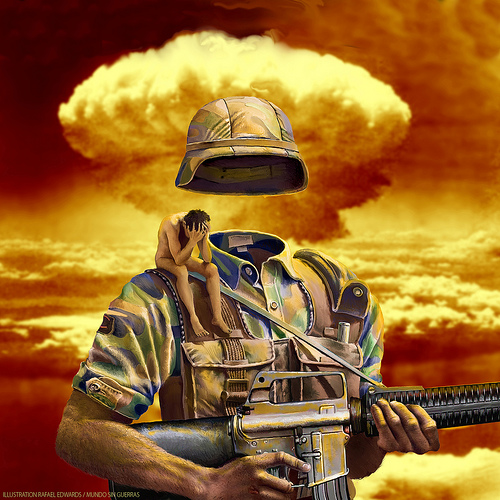By Meir Margalit
The headline of an article in the Jerusalem Post on August 3rd, days before the agreed ceasefire, signed by Eric Mandel, has left me stunned, shocked. Its title reads: “Lessons to learn before the next war.” The war continued, the tanks were still raging, people on both sides were still dying and killing each other, but the author of this note, a certainly precocious and clairvoyant man, is quick to take stock and draw the necessary conclusions to prepare the country into the looming war, this time against the Hizbollah militia in Lebanon. Aware that the arsenal of Hizbollah has 100,000 missiles more accurate than those fired by Hamas and, knowing that the next war will claim many more lives than the current one, this warlord does not make a call to prevent it, to avoid further bloodshed, but rather, he encourages the government to immediately start polishing swords, plan out the next attacks, thoroughly prepare the civil defence, organise the mass destruction more effectively. This delusional note would not have worried me too much, if it had not reflected reliably the Israeli public opinion and revealed the dominant political line in the current Israeli government. Every war is a prelude to the next skirmish, every battle is the dress rehearsal for the next contest, one that is already brewing and will be bloodier than the last one.
This is the product of a country unable to resolve its disputes other than through the use of force; a country whose range of options to address the relations with its neighbours goes from the use brute force to the use of the fierce force. In his conceptual world there is no room for negotiation, no peaceful means, option other than the military are unknown. It is a type of psychological incapacity, a mental atrophy, which keeps its leaders stagnant in a warmongering phase in its history. It would seem that Israel cannot do without any enemy at a time, and always needs some battle to feel fulfilled.
This mental narrowness is due to the excessive weight of the army in Israeli society, an institution that obviously knows not other language than the military, whose vision is as narrow as the angle of the scope of their rifles and never, ever feels sated, for every fight it is involved with, will conclude with the feeling that it needed a few more days to destroy the enemy conclusively and were it not for the government’s inability to withstand international pressure, the battle would had ended with a great win. “Frustration” – defines the overall flavour that at the end of this battle – “a feeling that we have wasted a chance”! How sad to know that we put our children’s lives in their hands.
The history of Israel has become a fatal succession of wars, a perverse, morbid déjà vu. Many will say that such has always been the history of the Jewish people, pogrom after pogrom, but that was precisely the reason why the Zionist movement arose: to break that chain of hardship and suffering. From this perspective, the history of Israel is proof of the Zionist failure. 66 years after the Nakba, maybe that is the great achievement of the Palestinian resistance: the transformation of Israel into a gruesome battleground where people are doomed to fight ceaselessly, where life is nothing more than a circumstantial factor, constantly threatened. Obviously, this way it is not possible to maintain a long-term country: at this rate, the country wears off by itself, is consumed every day. What Arab countries have failed to do in the battlefield, we Israelis have achieved by our own hands in the social field. This mindset is the most serious danger facing Israel. This is the area in which Israeli pacifism should concentrate its work. This is strongest evidence of how urgently necessary our work is.
Dr Meir Margalit is a member of the Editorial Board of No Permit, Jerusalem resident and an active member of the Israeli peace camp.
Israel: Preparing the next war before the weapons have cooled down
-
This post is also available in: Spanish, Italian






